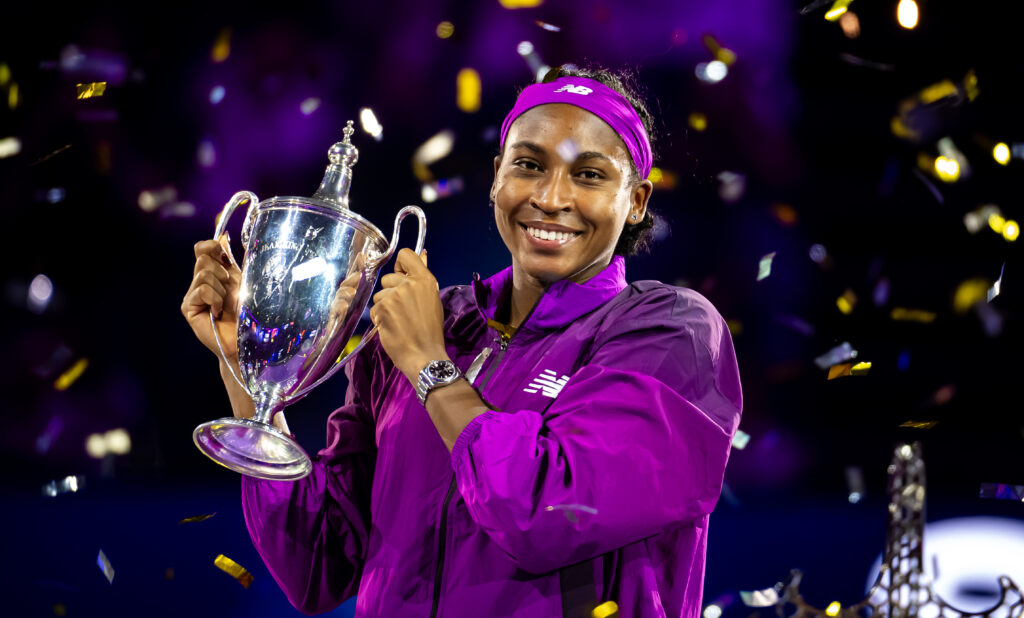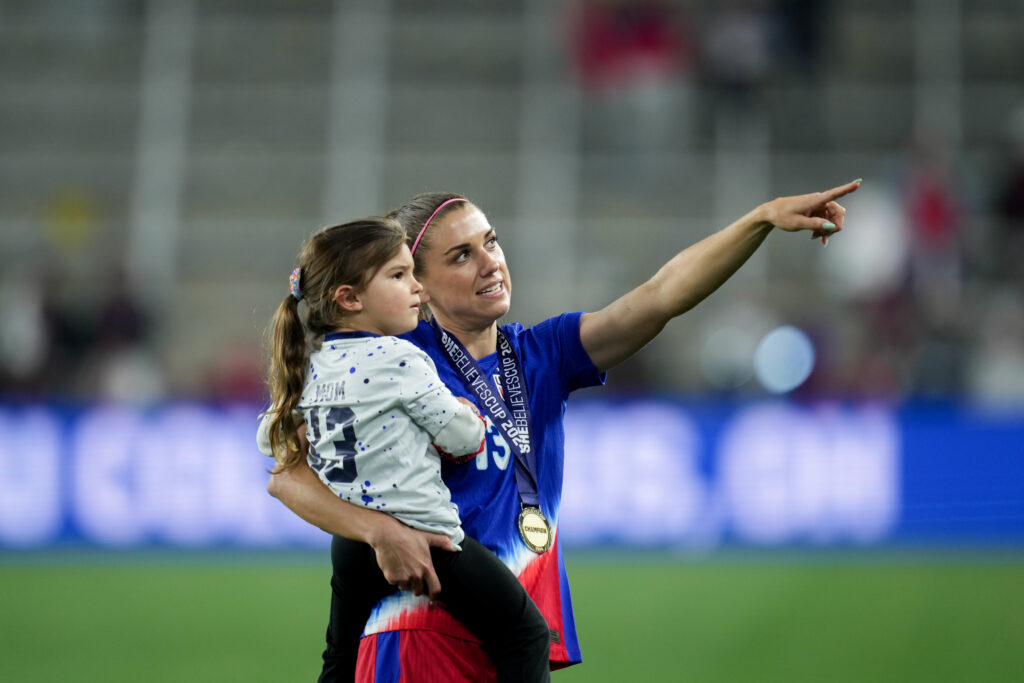Fever rookie Caitlin Clark rocketed to the upper tiers of Sportico's annual highest-paid women's sports athletes report on Wednesday, landing in 10th place with an estimated $11 million in yearly earnings.
With tournaments like the US Open guaranteeing equal purses across men's and women's events, tennis players dominated the findings, accounting for nine of the 15 entries. This includes first-place Coco Gauff, who, with $9.4 million in prizes plus $21 million in endorsements, tops the list for the second year in a row.
Skier Eileen Gu came in second, complementing her individual earnings with the list's highest-estimated endorsement profits at $22 million. Gymnast Simone Biles came in at No. 9 with an estimated $11.1 million in total income.
Golfers Nelly Korda and Lydia Ko also made the cut, mirroring the LPGA Tour's expanded purses.
Report highlights endorsements in women's sports
The report underlines the continued importance of endorsements in the women's game — particularly within team sports, where many athletes rely on supplemental income to boost relatively small pro salaries.
However, 2024's estimated $221 million in total earnings is up 27% over last year, with 11 athletes making at least $10 million compared to six in 2023.

Sportico's 15 highest-paid women's sports athletes
1. Coco Gauff: $30.4 million
Prize money: $9.4 million | Endorsements: $21 million
2. Eileen Gu: $22.1 million
Prize money: $62,000 | Endorsements: $22 million
3. Iga Świątek: $21.4 million
Prize money: $8.4 million | Endorsements: $13 million
4. Zheng Qinwen: $20.6 million
Prize money: $5.6 million | Endorsements: $15 million
5. Aryna Sabalenka: $17.7 million
Prize money: $9.7 million | Endorsements: $8 million
6. Naomi Osaka: $15.9 million
Prize money: $870,000 | Endorsements: $15 million
7. Emma Raducanu: $14.7 million
Prize money: $671,000 | Endorsements: $14 million
8. Nelly Korda: $14.4 million
Prize money: $4.4 million | Endorsements: $10 million
9. Simone Biles: $11.1 million
Prize money: $135,000 | Endorsements: $11 million
10. Caitlin Clark: $11.1 million
Salary/bonus: $100,000 | Endorsements: $11 million
11. Jasmine Paolini: $10 million
Prize money: $6.5 million | Endorsements: $3.5 million
12. Jeeno Thitikul: $9.1 million
Prize money: $7.1 million | Endorsements: $2 million
13. Jessica Pegula: $8.2 million
Prize money: $4.2 million | Endorsements: $4 million
14. Elena Rybakina: $7.9 million
Prize money: $3.9 million | Endorsements: $4 million
15. Lydia Ko: $6.7 million
Prize money: $3.2 million | Endorsements: $3.5 million
USWNT icon Alex Morgan announced today that she is retiring from professional soccer, and will lace up her boots one last time for the San Diego Wave on Sunday, September 8th. Morgan, one of the faces of the USWNT's fight toward equal pay, retires a two-time World Cup champion, Olympic gold medalist, and UWCL and NWSL champion.
The 35-year-old also announced on Thursday that she is pregnant with her second child, growing her family after having her daughter, Charlie, in 2020.

Morgan's off-pitch legacy changed the game
Not only did Morgan help oversee the USWNT’s fight for equal pay, which was ratified in the team's CBA in 2022, she also played a huge part in the NWSL's 2021 watershed change that enacted policies to protect players.
“We're changing lives, and the impact we have on the next generation is irreversible, and I'm proud of the hand I had in making that happen,” said Morgan in a video posted to X.
“Charlie came up to me the other day and said that when she grows up she wants to be a soccer player,” Morgan explained. “And it just made me immensely proud. Not because I wish for her to become a soccer player when she grows up, but because a pathway exists that even a four year old can see now.”
On-field accomplishments made Morgan an international icon
Bursting onto the USWNT scene in 2010, Morgan's legacy includes her "Baby Horse" moniker and crucial goal contributions on the field.
Her most well-known scoring moments include notching the final goal of the USWNT’s Olympic semifinal match against Canada en route to their 2012 gold medal, and her soaring header in their 2019 World Cup semifinal against England — the goal that spurred her world-famous "sipping tea" celebration.
Morgan’s 176 combined international goals and assists ranks fifth all-time in USWNT history. She trails only Mia Hamm, Abby Wambach, Kristine Lilly, and Carli Lloyd on the national team's stat sheet.
In NWSL play, Morgan's resume includes the 2013 league championship, the 2022 Golden Boot title, and the 2023 NWSL Shield.
Ultimately, Morgan will be remembered as the face of a USWNT generation that excelled during a crucial era of the team's success — though the change she helped usher in off the pitch will arguably have an even bigger impact.
Argentina women's national football team starting goalkeeper Laurina Oliveros, defender Julieta Cruz, and midfielder Lorena Benítez have officially left the team after a dispute over a lack of pay and conditions.
The news comes while the team is away at training camp during the FIFA international window. Argentina is scheduled to play two international friendlies at home against Costa Rica on May 31st and June 3rd — matches that Argentina's soccer association is refusing to pay its players for, according to Cruz and Benítez.
"We reached a point in which we are tired of the injustices, of not being valued, not being heard and, even worse, being humiliated," Cruz, a defender, wrote in an Instagram post published early this week. "We need improvements for Argentina's women's soccer national team, and I am not only talking about finances. I speak about training, having lunch, breakfast."
Argentina qualified for the 2023 Women’s World Cup, but failed to make it out of the group stage after losing to Italy and Sweden and drawing with South Africa. That stands in stark contrast to the men’s team, which won the 2022 FIFA World Cup behind star forward Lionel Messi.
In her own Instagram post, Benítez alleged that players were provided only a ham and cheese sandwich and a banana as food during training camp, and that their families were being charged 5,000 pesos per ticket to see them compete against Costa Rica.
"And so millions of things we've been through, being FOOLED over and over again," Benítez added.
Goalkeeper Oliveros’s message was more concise than her teammates: "My wish for this year and the following? That generations to come may enjoy and be happy running behind the round, as perhaps at some point we were."
When the U.S. Soccer Federation and U.S. women’s national team players announced a historic settlement on Tuesday after a six-year fight over equal pay, they briefly celebrated before zeroing in on the next obstacle: FIFA’s unequal prize bonuses at the men’s and women’s World Cups.
The settlement laid out U.S. Soccer’s commitment to equal pay rates in tournaments, including the FIFA World Cup. That is not U.S. Soccer’s money to give away, but with the resolution in writing, the Federation affirmed it will support USWNT players in bringing their concerns to FIFA.
Both sides realize the profound challenge of taking on the global soccer behemoth, but there’s also a lot of power in being the No. 1-ranked women’s soccer team on the planet.
“I think with the players and the Federation in a place where we’re working together, it’s going to be pretty formidable,” forward Megan Rapinoe said of their case to FIFA. “I think it’s going to take aggressive and persistent and constant action on our part.”
To Rapinoe, that pressure involves persuading World Cup sponsors to invest more, or forming a federation coalition to confront FIFA.
“Clearly, they’re not all that motivated on their own to do anything, so you have to be loud and constant and aggressive in this sort of pursuit of equality,” she said. “They’re certainly in a place to do it, and it’s just a matter of them either feeling that the pressure is too much or — I don’t anticipate this, but — a sudden change of heart and mind.”
USWNTPA statement re: equal pay lawsuit settlement contingent on ratifying a new CBA pic.twitter.com/e0fNlAqECP
— USWNT Players (@USWNTPlayers) February 22, 2022
The equal pay settlement is entirely contingent on the ratification of a new collective bargaining agreement, which U.S. Soccer president Cindy Parlow Cone expects the Federation and the USWNT Players Association to finalize by March 31. At that point, they hope to have a detailed plan in place for confronting FIFA.
“It’s a little thought exercise that we have to do to make sure that the men’s and the women’s teams are being paid equally until FIFA equalizes it themselves,” said defender Becky Sauerbrunn. “We have amazing lawyers that are thinking through that and have come up with proposals that’ll be presented to the Federation.”
The players also have the U.S. men’s team on their side.
“It’s a great sign that we will come to a solution,” Sauerbrunn said.
The players expressed gratitude for Cone, the former USWNT World Cup champion and two-time Olympic gold medalist who has spearheaded U.S. Soccer’s negotiations since succeeding Carlos Cordeiro as president in 2020 after his ignominious resignation.
“On a personal level, with being a former player, this is something I have tried to resolve since the day I became president,” Cone said. “It took me a lot longer than I was expecting it to take, but we got here today and I couldn’t be more excited.”
In her opening statements on Tuesday, Cone said that she’ll “be the first to admit” the Federation’s mistakes in the past and she understands the players’ frustrations regarding equal pay.
“I know there is still a lot of work to do in continuing to build the relationship with U.S. Soccer and I am fully committed to doing so,” she said.
The Federation and USWNTPA have held 35 negotiated sessions toward a new CBA, with Sam Mewis telling reporters Tuesday that Crystal Dunn was in talks at that very moment.
Once that agreement is finalized, U.S. Soccer and the players will turn their attention to FIFA as a unified front, something that was hard to imagine just a few months ago when tensions were running high. Even two weeks ago, nine USWNT stars criticized U.S. Soccer for “[standing] by as abuse continued to occur unchecked” in a letter addressed to Cone and Cordeiro following new accusations made against former Chicago Red Stars coach Rory Dames.
“I think there’s a multi-pronged pressure approach we can put on FIFA, ultimately to do what is the right thing, but also what is the best business practice,” Rapinoe said.
They’ll have plenty of evidence to show for women’s soccer being good business. While the USWNT continues to draw sold-out crowds, the Women’s Champions League match between Barcelona and Real Madrid scheduled at Camp Nou in March sold all 85,000 tickets in three days and Canada’s win in the gold-medal match last summer was the most-watched event of the Tokyo Olympics.
“At this point, we’re not wondering if the women’s game can make money. We’re not wondering if there’s star power. We’re not questioning the equality on the field,” Rapinoe said. “I think, at this point, it’s just a willful discrimination and a willful negligence.”
Jessa Braun is a contributing writer at Just Women’s Sports covering the NWSL and USWNT. Follow her on Twitter @jessabraun.